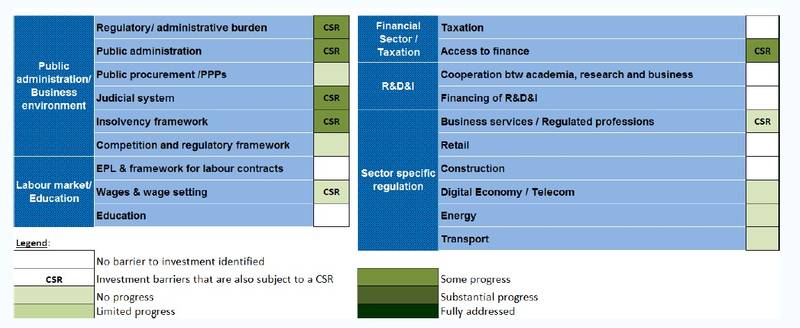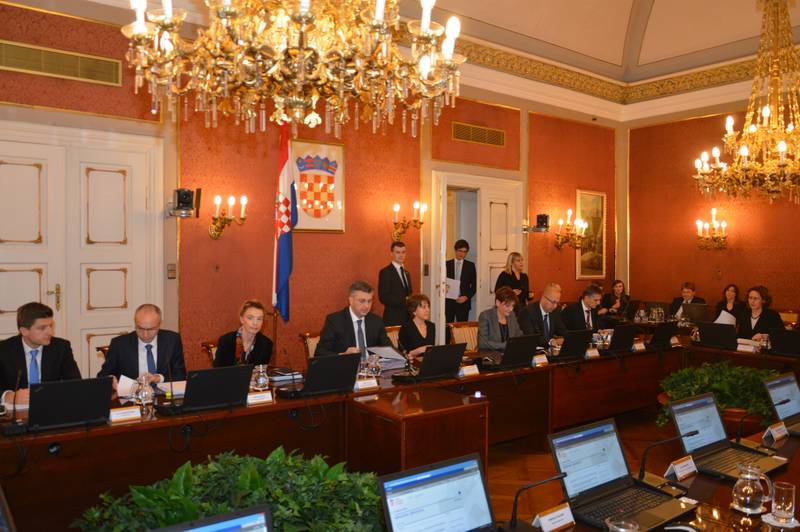Does Croatia Have the Political Will to Implement Reforms?
Adelina Marini, March 1, 2017
 All reforms, concerning Croatia’s long-term future, are practically blocked. This is the conclusion of the European Commission report on macroeconomic imbalances. Croatia is among the six countries experiencing excessive macroeconomic imbalances and are thus placed under special monitoring. Due to the political instability in Croatia in 2016, however, the EC reports a zero or insignificant progress on the five country-specific recommendations, the implementation of which is supposed to lead to a decrease in imbalances. All this is happening against a background of unexpectedly high growth, a decrease of budget deficit, and the beginning of a tendency towards a decrease in public debt. Croatia, however, has problems, which will hinder its economic convergence with the rest of the EU states and could prove to be an obstacle to its potential euro area membership as well, which has been a discussion topic in Zagreb for some time now.
All reforms, concerning Croatia’s long-term future, are practically blocked. This is the conclusion of the European Commission report on macroeconomic imbalances. Croatia is among the six countries experiencing excessive macroeconomic imbalances and are thus placed under special monitoring. Due to the political instability in Croatia in 2016, however, the EC reports a zero or insignificant progress on the five country-specific recommendations, the implementation of which is supposed to lead to a decrease in imbalances. All this is happening against a background of unexpectedly high growth, a decrease of budget deficit, and the beginning of a tendency towards a decrease in public debt. Croatia, however, has problems, which will hinder its economic convergence with the rest of the EU states and could prove to be an obstacle to its potential euro area membership as well, which has been a discussion topic in Zagreb for some time now.
The EC report makes it clear that Croatia has not made the necessary steps to ensure the full independence of the Fiscal Policy Commission, whose job is to monitor and analyse the government’s fiscal policy and signal in the event of it not performing on commitments made. Croatia has not done a lot on improving budgetary planning as well. The country is known for its frequent budget updates, although a tendency towards avoiding budget updates was seen over the last year. Poor budgetary planning, mind you, is a problem of all the countries in the former Yugoslavia region. Ever since Croatia’s accession in 2013 the EC has been warning that measures need to be taken against early retirement. Close to nothing has been done on solving the problems of fragmentation and distribution of competencies in the public administration.
There has been no progress in harmonising the wage-setting frameworks across the public administration, there is also insignificant progress made in reinforcing the monitoring of state-owned enterprises’ performance and boards’ accountability. The same limited progress has been made on something that affects businesses directly – reduction of parafiscal taxes and the administrative burden on businesses. There is some progress reported in the battle against non-performing loans. What is referred to here is the conversion of loans taken out in Swiss francs into euro, or kuna, but it is pointed out that this has led to considerable losses to the banking sector. Despite the conversion, the percentage of non-performing loans continues to be high compared to other member states, points out the EC.
 There is special attention paid to the cumbersome business environment, which depresses investment and productivity growth, the latter falling way behind Croatia’s Central and Eastern European peers, and in all sectors of the economy at that. Croatia is among the states where access to financing is difficult for small and mid-size enterprises. Another issue is that the education system reform is stalling, despite it being the very thing which drove tens of thousands of Croats out on the central square in Zagreb and other towns demanding an educational reform, which is independent and free of ideological burdens. Education, which is inadequate to current requirements, generates one of the lowest employment rates in the EU – 60.5% for the year 2015.
There is special attention paid to the cumbersome business environment, which depresses investment and productivity growth, the latter falling way behind Croatia’s Central and Eastern European peers, and in all sectors of the economy at that. Croatia is among the states where access to financing is difficult for small and mid-size enterprises. Another issue is that the education system reform is stalling, despite it being the very thing which drove tens of thousands of Croats out on the central square in Zagreb and other towns demanding an educational reform, which is independent and free of ideological burdens. Education, which is inadequate to current requirements, generates one of the lowest employment rates in the EU – 60.5% for the year 2015.
The EC notes that unemployment is dropping, but one of the reasons for this is that after the lifting of barriers more and more Croats choose to look for employment opportunities abroad. On some criteria, Croatia is the EU leader – the country has the lowest percentage of children dropping out of school early – 2.8% with the EU average being 11% and the goal of the EU for the year 2020 is to lower this percentage to 10% on average. The number of people at risk of poverty has also dropped – from 1.384 million in 2011 down to 1.216 million in 2014. The conclusion of the EC, however, is that despite currently having economic growth higher than its potential, “the economy is set to return to its long-term potential. This will slow down the convergence process and the unwinding of macroeconomic imbalances. Improving this long-term scenario will require determination in carrying out structural reforms”, is the message of the EC in the report.
Translated by Stanimir Stoev
 Kolinda Grabar-Kitarovic | © KGK
Kolinda Grabar-Kitarovic | © KGK Jozo Rados | © European Parliament
Jozo Rados | © European Parliament Aleksandar Vucic, Andrej Plenkovic | © Vlada RH
Aleksandar Vucic, Andrej Plenkovic | © Vlada RH